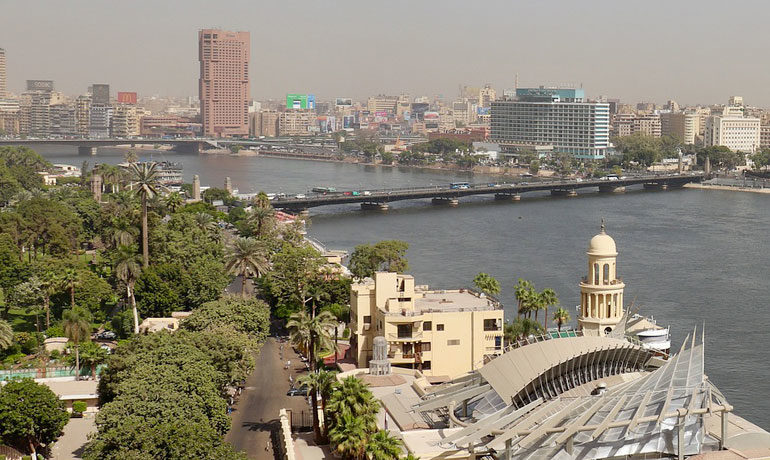The ongoing squabble between Egypt and Ethiopia on the filling of the Ethiopian Grand Renaissance Dam (GERD) appears to be a prelude of a looming water crisis in the region. Rapid population growth combined with economic growth is threatening to plunge the entire basin into a serious water scarcity. According to UN data, the population of the 11 Nile Basin countries stood at just 83 million in 1950, but grew to 321 million in 2000. The population now stands at 549 million, but is expected to balloon to more than 1 billion by 2050.
Egypt, which depends on the Nile for more than 85 percent of its fresh water needs, is already facing water shortage and pollution due to the mismatch between water demand and availability. Since the time of the pharaohs, Egyptian civilization has been sustained by the sediment-rich floods of the Nile, which are fed by the seasonal monsoon rains on the Ethiopian highlands and the equatorial lakes region of Africa. Modern Egypt too depends on the Nile for most of its water needs, from irrigated agriculture, which employs 55 percent of the population, to household consumption and industrial use. This, however, might soon change with a potential decline in the flow of the river, caused by the combination of rapid water use in upstream countries and erratic and potentially dwindling rainfall in the basin.
Egypt will have to adapt to a different future where upstream countries – with a growing economic muscle to launch projects independently – will make an increasing claim on the Nile waters. Generations of Egyptian leaders have made the mistake of presuming that the Nile is exclusively Egypt’s resource, and done too little to build a lasting cooperation with upstream countries. Egypt sees itself as a major regional and military power in the Middle East; for example, it provided medical assistance to the U.S. in the recent Covid-19 crisis. If Egyptian leaders had the right priorities, therefore, they had ample resources for nurturing a cooperative relationship with major riparian countries like Ethiopia and Uganda. In reality, they did just the opposite, using colonial-era treaties to hamstring upper Nile countries from utilizing their fair share of the Nile. An example of this is Egypt’s stance towards the Nile Basin Initiative, a multilateral agreement for an equitable development of the Nile, which it refused to join, demanding a veto power that would allow it to block all upstream projects.
That does not appear to be an exemplary way for a country to treat its important partners upon whom it is utterly dependent. The U.S., a global power, carefully nurtured relationships with several Middle Eastern autocracies for decades, even as it condemned authoritarian rule elsewhere, because the region provided the bulk of the oil supply needed to fuel its economy. China is investing hundreds of billions of dollars in Africa because it wants the continent’s natural resources. One would be hard pressed to find a positive example of what Egypt has done to showcase its goodwill to the countries that continue to sustain its very existence. Much less, it did not even do them the favor of leaving them alone, and purportedly supported rebel groups to keep them weak and divided.
Even today, Egypt’s offer for the Nile Basin countries is a deal composed of a short slogan – “Pass the water!” Egypt doesn’t offer a token of appreciation for upstream countries for the gift of life they have bestowed upon her, never mind treating them as strategic partners. Egypt’s rejection of the rights of these countries to use their own water resources is not a miscalculation but utter disregard to their right for life. As Meles Zenawi, the late Prime Minister of Ethiopia, once asserted in an interview to an Egyptian TV channel, there is no better proof of Ethiopia’s – and those of Nile basin countries’ – need for the Nile waters than the thousands of people that become victims of starvation from droughts every year.
The Nile is a troubled river that snakes through the fragile ecosystems of the Sahel and the Sahara. Its watershed has been subjected to severe forms of deforestation and land degradation, which are contributing to rising desertification. It is also botched by new risks such as the recent infestation of water hyacinth, an invasive weed that is threatening to choke up Lake Tana, the source of the Blue Nile. Egypt could have done more to invest in projects that tackle deforestation, reduce land degradation and mitigate environmental risks. Instead, downstream countries were left to their own devices, even as Egypt anointed itself as the sole, historical steward of the Nile.
In an act of utter disregard to these countries’ rights, Egypt diverted the Nile and transported it across the Suez Canal to the Sinai desert, and President Sadat even flirted with the idea of channeling it to Israel. This politically-motivated land reclamation project has received criticism for its wastefulness by the Egyptian media, as it would have been more efficient to use the water within the Nile valley rather than waste resources to transport it a distance of 300 kilometers. From other riparian countries’ perspective, it reveals Cairo’s deliberate disregard for a fair utilization of a shared water resource. When Egypt claims that dams like the GERD will cause “significant harm” on its current water usage, its counterfactual is an unfair water allocation scheme that includes water illegally channeled to the Sinai desert. Ethiopia has openly rejected these moves in statements to the UN Secretary General and the Organization of African Unity, making it clear that it did not recognize Egypt’s right to funnel the Nile to the Sinai desert as having any consequence to its fair, legitimate and equitable share of the Nile waters.
It is likely that the GERD will be a watermark in Egypt’s history of the Nile, but not in a way that many anticipate. Although Egypt still feels threatened by the dam, which it regards as an affront to its “water security” and a violation of its sacred claim on the Nile, it in fact offers a great, if uncomfortable, opportunity for revising its water security strategy. Just as the U.S. managed to wean itself off energy dependence on the Middle East through new technologies that enabled the fracking of shale oil, so Egypt too should turn to technology to wean off its reliance on far off rains in Ethiopia’s highlands. Egypt is abundantly endowed with solar energy, and has ready access to seawater from the Red Sea and the Mediterranean. With rapid cost and efficiently improvements in solar energy technologies, it is only a matter of time before it becomes affordable to build solar-fueled desalination plants to satiate a good share of its growing fresh water needs.
Old habits die hard, especially if they are a few thousand years old. Egypt recoils from news of water development projects in upstream countries, regarding them as threats to its water security. But the GERD is best seen as an opportunity to reexamine these vintage policies. It is time for Egypt to forge its own destiny by weaning off its dependence on the unreliable and dwindling flow of the Nile.
Explore more on Nile Basin Population Projection Dashboard

Addisu Lashitew
Addisu Lashitew is a David M. Rubenstein Fellow in the Global Economy and Development program at the Brookings Institution. He has previously held postdoctoral researcher positions at Erasmus University Rotterdam (The Netherlands) and Simon Fraser University (Canada). Lashitew’s research interest spans various topics in development economics, including firm growth and productivity, resource allocation, and economic diversification. His most recent research has looked into market-based corporate approaches toward sustainable development and poverty alleviation. He has actively published on the topics of financial inclusion, social innovation, inclusive business strategies, sustainable finance, and Base of the Pyramid strategies. Lashitew maintains teaching and research affiliations with the African Economic Research Consortium (AERC) in Nairobi, and the School of Commerce of Addis Ababa University, Ethiopia. Addisu Lashitew is a research fellow at the Brookings Institution. He can be reached at alashitew[at]brookings.edu.

